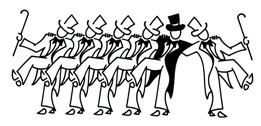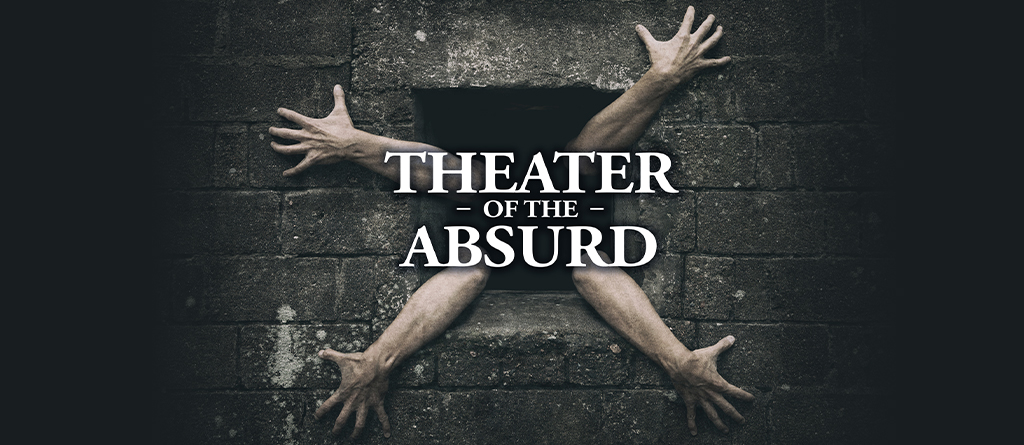Because Waiting for Godot is a stunning example of “theater of the absurd,” and because this is the first “absurdist” play Independent Players has produced—other than Eugene Ionesco’s The Bald Soprano, which it produced in 2015 at the Elgin Fringe Festival—we thought it might be helpful to explain what Absurdism is and why playwrights of many nationalities have written absurdist plays. Many of the playwrights, who have championed this manner of expression, lived in Paris because they found this city open to more expansive freedom of speech than virtually anywhere else in the 1940s. Samuel Beckett, who is Irish, originally wrote Godot in French so that it would be able to stage it in Paris; later, of course, he translated it into English. It is one play that the major theater companies around the world have staged it at least once for their patrons.
One needs to understand at the outset that the playwrights whose plays are discussed critically under the collective heading of “Theatre of the Absurd” did not consider themselves part of any movement. Most of them thought of themselves as “outsiders.” They differ greatly in terms of subject matter and form. What they shared in their work is the preoccupations and anxieties, emotions and thinking of many of their contemporaries in the Western world. What people firmly believed in years past had been pushed aside by “faith in progress” and “nationalism.” All the lessons of the past which people held dear were meaningless. In a world where reason no longer explained everything, people often felt alienated and gave up hope.
The term “absurd” as defined by Webster’s Dictionary is: “laughably inconsistent with what is judged as true or reasonable.” In other words, the term is applied to anything which is perceived as having no purpose. When man is cut off from his roots, he becomes lost. In that state of mind, his actions may seem senseless and useless. One might find that human life in the past 20 months closely resembles life as the Absurdist playwrights view it; and we are still waiting!
The subject of the play is not Godot, but waiting–that is, the act of waiting as an essential and characteristic aspect of the human condition. The play does not tell a story; instead, it explores a static situation.Vladimir and Estragon, two old tramps, are waiting on a country road, by a tree. Their dialogue resembles the repetitive quality of the cross-talk comedians of the music halls and the circus in the early 1900s. In fact, the parallel to the music hall and the circus is explicitly stated in their banter early on. They are basically clowns who, in the tradition of the music hall or the circus, engage in some crudely physical humor, gags and pratfalls. They have complementary natures, but despite constant bickering, they depend upon each other so completely, that they must stay together in order to go on.
Soon they encounter Pozzo and Lucky, who are equally complementary in their natures but whose relationship is more primitive: Pozzo is the powerful master, Lucky is the submissive slave. In essence, these two represent the relationship of body and mind, the material and spiritual sides of man, where the intellect is subordinate to the appetites of the body. After they depart, a young boy arrives to inform the tramps that Mr. Godot
cannot come this evening, but that he will come tomorrow. Act II essentially repeats the same sequence of events as was seen in Act I, but the circumstances are vastly different. The variations simply serve to emphasize the overall “sameness” of the situation of the two different days.
All in all, the routine of “waiting” for Godot stands for “habit,” which prevents a person from reaching the painful awareness of the full reality of being. Habit then as Beckett himself describes it is “the generic term for the countless treaties concluded between the varying aspects of the individual and the world when the boredom of living is replaced by the suffering of being (which is the free play of every human faculty. Habit paralyses our attention and prevents us from keeping life alive. The hope of salvation may be merely an evasion of the suffering and anguish that spring from facing the reality of the human condition.” All in all, Waiting for Godot is open to philosophical, religious and psychological interpretations, yet above all, it is a poem on time, evanescence, and the mysteriousness of existence, the paradox of change and stability, necessity and absurdity.


